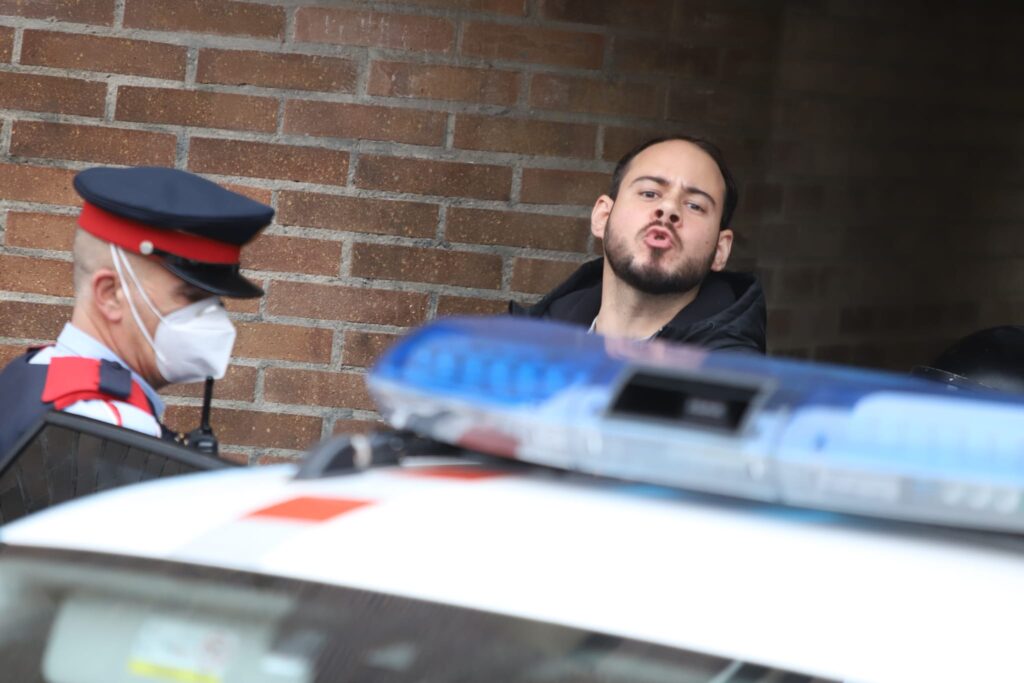16.02.2021 - 08:48
|
Actualització: 16.02.2021 - 09:48
The Catalan rapper Pablo Hasél was arrested in Lleida University, western Catalonia, on Tuesday at 8.30 am by the Catalan police (see pictures). Spain’s National Court has sentenced Hasél to two years and nine months behind bars for two separate cases relating to his songs and tweets. The judiciary deemed them to be “glorification of terrorism” and slander to the crown and Spanish law enforcement. Amnesty International considers that sending Hasél to prison is “unfair and disproportionate”.
'Mort a l'estat feixista' – Pablo Hasel pic.twitter.com/ZRkthIeGIK
— Joan Mangues (@jmangues) February 16, 2021
Spain is one of the most repressive countries in relation to artistic freedom. According to a study by Freemuse, an international NGO defending artistic freedom, Spain is the country that has sentenced more musicians to jail in 2018. There are fourteen rappers -Valtonyc, Pablo Hasel and the members of the group La Insurgencia- who have been condemned for crimes of terrorism or offending the Spanish royals
Barricaded inside the university
Hasél barricaded himself inside the university on Monday, after the expiration of the 10-day window he was granted to turn himself in to serve his time behind bars. The Catalan Mossos d’Esquadra police operation began on Tuesday early morning, when officers removed one by one the Hasél’s supporters who had barricaded with him using chairs and desks in the university. In the end the law enforcement arrested the musician in the institution’s rector’s office.
On Monday, the musician made clear he would not turn himself in: “I’m locked inside the University of Lleida among many supporters, they’ll have to blow it up to detain me and put me in prison,” he said in a tweet.
Freedom of speech
Hasél’s case has had a big impact in the media for a long time, given the fact that his conviction prioritized the Spanish criminal code at the expense of the freedom of speech. Last Thursday, 60 cultural bodies held an online protest, organized by the Catalan Academy of Music, while around 140 writers and journalists released a new manifesto defending the rapper, with one day before the court’s deadline arrived.
“Today it is Pablo Hasél, tomorrow it will be any other creator or performer from any other discipline,” said the manifesto read during the event. The writers and journalists included Jordi Évole, Rosa María Calaf, Manuel Rivas and Maruja Torres, who released a statement in support of Hasél, saying rapping “is not a crime,” even if the lyrics are unpleasant.
Thursday’s outpourings of support followed on from another manifesto earlier last week, entitled ‘Without freedom of speech there is no democracy’, whose 200 signatories included luminaries such as Catalan singer Joan Manuel Serrat, Spanish film directorPedro Almodóvar and actors Javier Bardem, Alba Flores and Aitana Sánchez Gijón.
Spanish government
Last Monday, the Spanish government said that it will propose not punishing “verbal excesses” in arts with prison convictions. The executive suggested that only behaviors that can “clearly” lead to risk against public order or spark violence would lead to a prosecution, but never imprisonment.


